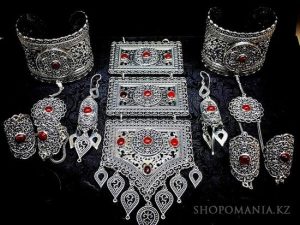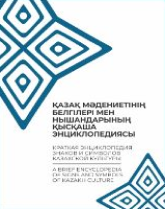




The metal that also has celestial symbolism in Turkic culture is kumis – silver. Unlike gold, silver was considered an exclusively feminine metal, which on the one hand was semantically associated with the moon, moonlight and feminine origins, but on the other hand was also a sign of the underworld, night and death. That is, gold/silver in a series of binary opposites – sun/moon, day/night, male/female, and fertilising/generating.
In world culture, silver is understood as the metal of emotion and love – a pure metal and a kind of feminine symbol – softness, malleability, intuition and wisdom, as well as the embodiment of grey – age, wisdom. The word “silver” is often found in Avesta texts, where it is associated with the ritual preparation of haoma, purification rituals, and the concept of “shine.” Silver’s association with water is confirmed by its inclusion in hydronymics, meaning that silver is a semantic signifier of the element water.
Silver is a favourite metal of Kazakh jewellers, whose widespread use is associated with its purifying, preservative, and magical properties. The Kazakhs associated the shine and colour of the metal with moonlight and femininity, and considered it a noble metal representing the sacred flow of the sky (the Milky Way).
It is an active participant in the rituals of the life cycle, for example, the ritual bathing of the child after 40 days in water with silver rings and coins, which is called “Balanyn küni küumіstei zharyk bolsyn!” (“May the child’s days be as bright as silver!”). The purifying properties of silver are emphasised by the traditional expressions sändikke altyn, kumis-tazalyqqa, meaning gold for beauty and silver for purity. Silver jewellery was believed to appease the impure female nature and sanctify the food prepared by her.
The Kazakhs’ preference for silver was also reflected in the names they gave it: Kümis, Kümisai, Kümisbala, etc. In addition, silver also reflects the sound poetic preferences of the Kazakhs, which is reflected in the expression “kümbirlegen kümis küi” – the silver sounds of küi, and the Kazakhs say about a singer who impresses with his virtuoso performance accompanied by a musical instrument: “kümis kömey, zhez tañdai” – the silver voice, the tinny palate.


